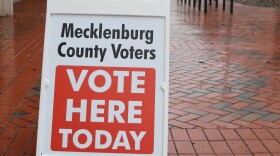In the aftermath of the U.S. Department of Education’s FAFSA form delays, financial aid application submissions are down at public universities in North Carolina.
The North Carolina State Education Assistance Authority (NCSEAA) reports a 10% decrease in form submissions to the state’s public universities compared to last year. Historically Minority-Serving Institutions in the UNC System have been hit particularly hard, with a 13% decrease.
The U.S. Department of Education released its new FAFSA form in late December. What was advertised as a simplified form meant to streamline applications was instead an error-filled process that led to complications for students, their families, and university administrators. Like Sharon Oliver, the associate vice chancellor for enrollment at North Carolina Central University.
“A significant concern for our institution is the overall impact on enrollment for the incoming class of 2024,” Oliver said at a UNC Board of Governors committee meeting Wednesday. “(As a university) serving and supporting a high percentage of Pell Grant students, as well as first generation students, financial aid is a lifeline to financial clearance and validation.”
Universities use the FAFSA form to create packages that combine financial aid funds. That includes state and federal financial aid awards for students with lower household incomes, such as federal Pell Grants and the state’s Next NC Scholarship.
Last month, the U.S. House of Representatives Committee on Education and the Workforce held a panel on FAFSA delays. One of the administrators who testified at the hearing was from a UNC System School.

Rachelle Feldman, vice chancellor for enrollment at UNC-Chapel Hill, testified that first-generation students, along with low-income, rural and students of immigrant parents are hurt the most by the FAFSA delay.
“(Students) who’ve heard all their life that college is out of their reach,” Feldman said in the April hearing. “They’ve worked hard for 12 years, but all the voices around them are saying they can’t afford it. And we can’t get them the document that proves they can.”
However, the FAFSA delay doesn’t seem to have made a drastic impact on UNC’s enrollment numbers for next school year. At a UNC-Chapel Hill Board of Trustees meeting last week, Interim Chancellor Lee Roberts said the university's yield rate — or the percentage of admitted students who enrolled — is up by 3% compared to last year.

This statistic is not the same for some of the state’s Historically Black Colleges and Universities. Although applications are up for the HBCUs compared to previous years, Oliver said how many actually enroll at N.C. Central could depend on completed FAFSA applications.
“'Will our students be able to pay for college this fall?' is the question at hand for us,” Oliver said. “If our students are unable to gain access to financial aid, we will experience a decrease in enrollment.“
According to the NCSEAA, FAFSA form completions for potential new students for Historically Minority-Serving Institutions in the UNC System are down by 17%.

However, administrators from most of the System’s HBCUs said they are more so worried about the decline in submissions for returning students.
Farrah Ward, the vice chancellor for academic affairs at Elizabeth City State University, said there’s been a 30% decrease in completed FAFSA applications for its continuing students.
“The issue really started with our continuing students, which we weren’t initially focused on,” Ward said at the Board of Governors committee meeting. “We thought that the new students were our real primary population … but our continuing students were lagging significantly behind.”
ECSU has since created and strengthened several outreach strategies to counteract lowering FAFSA applications. This includes hosting FAFSA nights, launching text messaging campaigns and hiring a financial aid advisor to help students experiencing form complications.

N.C. Central and North Carolina A&T State University, as well as HBCUs across the U.S., have made similar moves.
Joseph Montgomery, N.C. A&T’s associate vice provost for enrollment, said it’ll take a lot of work over the summer, but the university is working hard to reverse the FAFSA completion trend.
“We have to make certain that we have enough people resources to implement all the strategies that we're trying to deploy,” Montgomery told the Board of Governors. “Making certain we use those resources appropriately to ensure that we do get to the end. There is this window of time that. If we execute flawlessly, we should be okay.”







